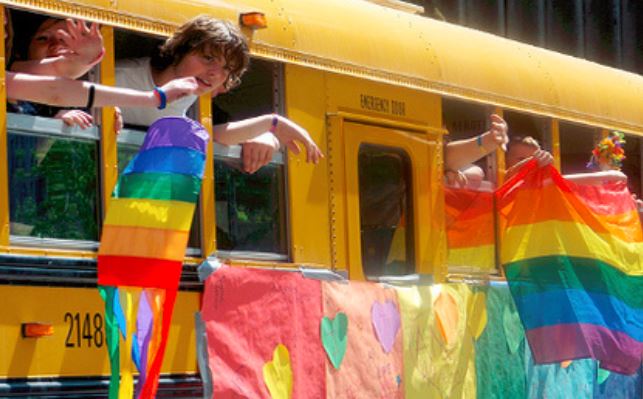In 2011, California’s state legislature passed the Fair, Accurate, Inclusive and Respectful (FAIR) Education Act.
The law, the first of its kind in the U.S., required, among other things, that schools educate children on the contributions of LGBTQ individuals. By 2016, California’s state education board had approved 10 LGBTQ-inclusive history texts for children in kindergarten through the 8th grade.
There is a saying: “As goes California, so goes the nation.” Yet despite this adage, for years California remained the lone U.S. state with LGBTQ-mandated classroom instruction.
That could be changing.
Last week, the Illinois Senate passed a bill that would make LGBTQ history lessons mandatory in public schools.
“I believe it is important to teach LGBT history in schools to increase compassion and understanding as well as to provide historical role models for LGBT students,” Illinois Sen. Heather Steans, the lawmaker who sponsored the legislation, told Newsweek.
The legislation fits the national trend of public schools serving as a vehicle to instill social justice values in children.
The power to educate and instill moral values in the next generation is an immense one, and there has long been concern in America about the potential of governments to misuse that power. This concern actually predates the American education system.
In 1840, as Americans were being introduced to Horace Mann’s Common School Movement, a special legislative committee in Massachusetts met to discuss increasing government control over education. Many, looking to models in Europe, saw problems saw the potential for abuse.
“The right to mould the political, moral, and religious opinions of his children is a right exclusively and jealously reserved by our laws to every parent,” the committee concluded, “and for the government to attempt, directly or indirectly, as to these matters, to stand in the parent’s place, is an undertaking of very questionable policy….
The moment this interest is surrendered to the government, and all responsibility is thrown upon civil power, farewell to the usefulness of common schools, the just pride, honor, and ornament of New England; farewell to religious liberty, for there would be but one church [the government]; farewell to political freedom, for nothing but the name of a republic would survive such a catastrophe.”
What differentiates the legislation in Illinois from the law in California is that it requires public schools to offer classroom LGBT history instruction instead of merely encouraging it or offering curriculum materials to schools.
Education experts have long expressed skepticism about lawmakers dictating curriculum or writing academic standards.
“It’s just completely an overreaction for state legislatures to believe they can develop and manage and implement academic standards,” said Reggie Felton, a spokesman for the National School Boards Association, while speaking to the Washington Post about the trend. “They don’t have the technical capacity to do that.”
Others said lawmakers are prone to injecting partisan politics into classrooms. “There has always been the temptation to use schools for purposes other than schooling, for proselytizing and other ends, since children are the ultimate captive audience,” J. Martin Rochester wrote in his book Class Warfare.
Some believe that social justice education is an imperative in schools. Others have grave concerns with social justice education. (And I certainly have my doubts about moral education of this sort.)
Whatever one believes, surely this decision is better left to school boards and local administrators than partisan lawmakers. This was the path Massachusets recently took when it announced it was offering LGBTQ-inclusive lessons to schools next fall.
Parents, educators, and administrators may agree or disagree with LGBTQ-focused lesson plans. Either way, they’ll have an opportunity to discuss the matter and perhaps shape the policy. Win or lose, that makes a big difference.
















Leave a Comment
Your email address will not be published. Required fields are marked with *